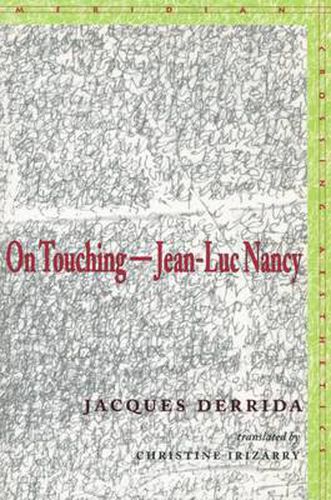Readings Newsletter
Become a Readings Member to make your shopping experience even easier.
Sign in or sign up for free!
You’re not far away from qualifying for FREE standard shipping within Australia
You’ve qualified for FREE standard shipping within Australia
The cart is loading…






Using the philosophy of Jean-Luc Nancy as an anchoring point, Jacques Derrida in this book conducts a profound review of the philosophy of the sense of touch, from Plato and Aristotle to Jean-Luc Nancy, whose ground-breaking book Corpus he discusses in detail. Emmanuel Levinas, Maurice Merleau-Ponty, Edmund Husserl, Didier Franck, Martin Heidegger, Francoise Dastur, and Jean-Louis Chretien are discussed, as are Rene Descartes, Diderot, Maine de Biran, Felix Ravaisson, Immanuel Kant, Sigmund Freud, and others. The scope of Derrida’s deliberations makes this book a virtual encyclopedia of the philosophy of touch (and the body).
Derrida gives special consideration to the thinking of touch in Christianity and, in discussing Jean-Luc Nancy’s essay Deconstruction of Christianity, devotes a section of the book to the sense of touch in the Gospels. Another section concentrates on the flesh, as treated by Merleau-Ponty and others in his wake. Derrida’s critique of intuitionism, notably in the phenomenological tradition, is one of the guiding threads of the book.
On Touching includes a wealth of notes that provide an extremely useful bibliographical resource. Personal and detached all at once, this book, one of the first published in English translation after Jacques Derrida’s death, serves as a useful and poignant retrospective on the work of the philosopher. A tribute by Jean-Luc Nancy, written a day after Jacques Derrida’s death, is an added feature.
$9.00 standard shipping within Australia
FREE standard shipping within Australia for orders over $100.00
Express & International shipping calculated at checkout
Stock availability can be subject to change without notice. We recommend calling the shop or contacting our online team to check availability of low stock items. Please see our Shopping Online page for more details.
Using the philosophy of Jean-Luc Nancy as an anchoring point, Jacques Derrida in this book conducts a profound review of the philosophy of the sense of touch, from Plato and Aristotle to Jean-Luc Nancy, whose ground-breaking book Corpus he discusses in detail. Emmanuel Levinas, Maurice Merleau-Ponty, Edmund Husserl, Didier Franck, Martin Heidegger, Francoise Dastur, and Jean-Louis Chretien are discussed, as are Rene Descartes, Diderot, Maine de Biran, Felix Ravaisson, Immanuel Kant, Sigmund Freud, and others. The scope of Derrida’s deliberations makes this book a virtual encyclopedia of the philosophy of touch (and the body).
Derrida gives special consideration to the thinking of touch in Christianity and, in discussing Jean-Luc Nancy’s essay Deconstruction of Christianity, devotes a section of the book to the sense of touch in the Gospels. Another section concentrates on the flesh, as treated by Merleau-Ponty and others in his wake. Derrida’s critique of intuitionism, notably in the phenomenological tradition, is one of the guiding threads of the book.
On Touching includes a wealth of notes that provide an extremely useful bibliographical resource. Personal and detached all at once, this book, one of the first published in English translation after Jacques Derrida’s death, serves as a useful and poignant retrospective on the work of the philosopher. A tribute by Jean-Luc Nancy, written a day after Jacques Derrida’s death, is an added feature.